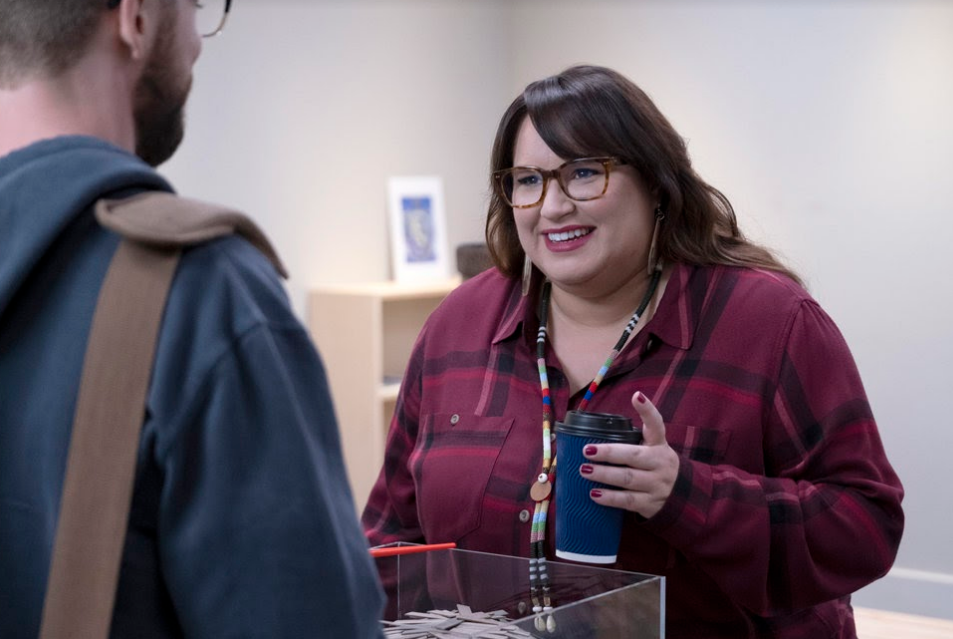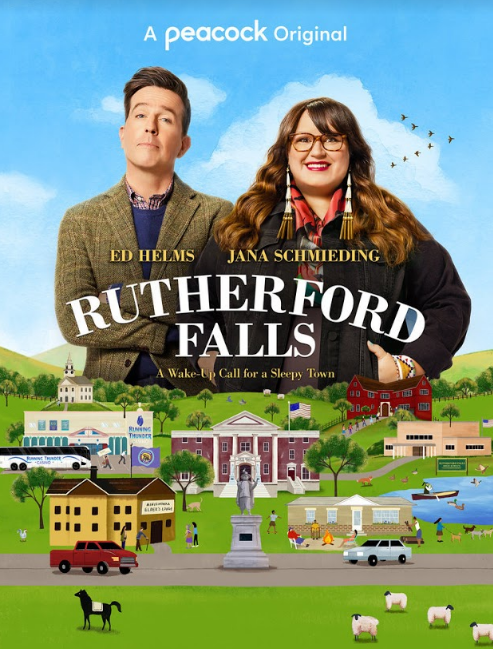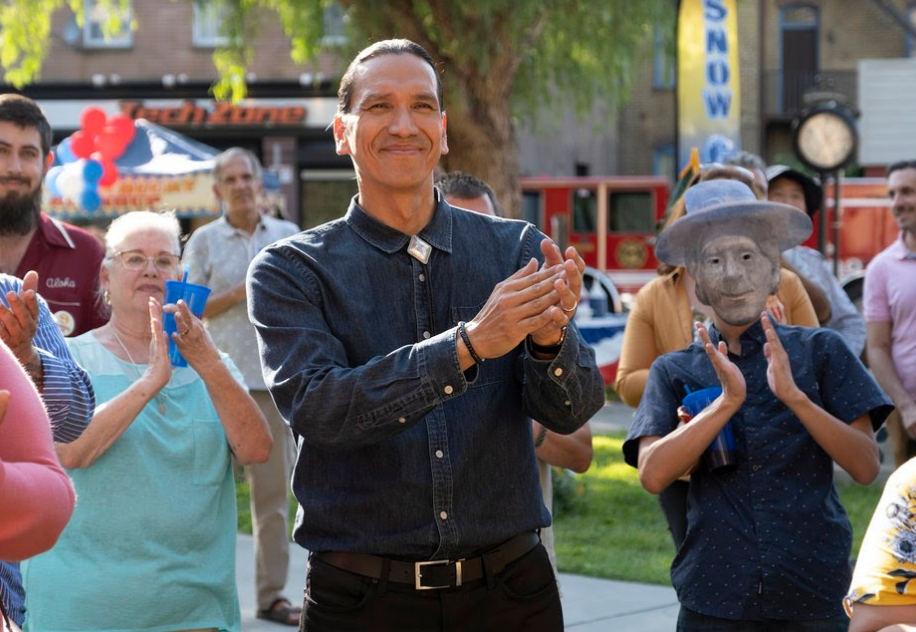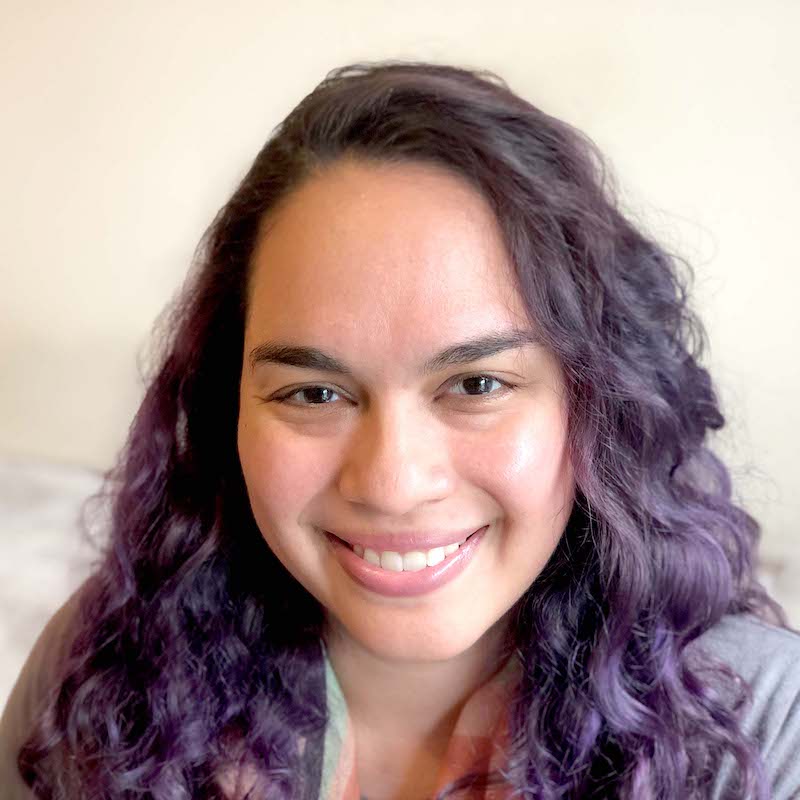
- Details
- By Monica Whitepigeon
Native people have endured countless atrocities, survived plagues, withstood erasure, mended community trauma and still manage to laugh it off. Humor is a powerful tool when it comes to survival and healing, which is why some Natives are bringing NDN humor to American sitcoms.
At Peacock Original, Indigenous creatives are pushing the barriers and breaking down stereotypes with the new comedy show “Rutherford Falls.” Showrunner and co-creator Sierra Teller Ornelas (Navajo) teamed up with primetime alums and executive producers Michael Schur (“Parks & Recreations,” “The Good Place”) and Ed Helms (“The Office,” “The Hangover”) to develop the series.

“This is the most organic and collaborative thing I’ve ever been a part of,” said Schur, who met Ornelas while working on the comedy series “Brooklyn Nine-Nine.” The three spent nearly a year developing the concept that presents contemporary Native narratives in humorous ways while acknowledging the murkiness of America’s history with its original people.
“We’re doing this for the aunties,” Ornelas claimed during a Q&A with LA Skins Fest. She explained that many ideas blossomed from her previous Native anthology works, and several of the show’s characters were inspired by her mother’s time at Indian art markets.
Ornelas, who got her start writing on the ABC series “Happy Endings,” knew there would be challenges in presenting her unique Indigenous perspective but managed to finesse involving as many Natives both on and off screen. Encouraged by Schur, she secured a widely diverse writing team with five Native staffed writers, one of the largest on television. Along with Ornelas, writers include Tazbah Chavez (Nüümü/Diné/San Carlos Apache), 1491’s Bobby Wilson (Sisseton-Wahpeton Dakota), Tai Leclaire (Kanien’kehá:ka [Mohawk Nation]/Mi’kmaq), and the show’s protagonist Jana Schmieding (Cheyenne River Lakota Sioux).
“Rutherford Falls” revolves around two lifelong best friends, Nathan Rutherford (Helms) and Reagan Wells (Schmieding), who have centuries-old familial ties to their small town. Both find themselves at a crossroads when the town becomes divided over a founder’s statue.
“The show isn’t about political things, it’s about people. When you focus on the humanity of the characters, it opens the door to so much more,” Schmieding notes.
For her breakout role, Schmieding was thrilled to work alongside the series other stars like Michael Greyeyes (“I Know This Much Is True”), Jesse Leigh (“Heathers”) and Dustin Milligan (“Schitt’s Creek”).
“When I would drive to work, there was joy every day and I’d be laughing all day. It was literally the most fun I’ve ever had,” Greyeyes said, who the writers affectionately nicknamed “Uncle Mike.”
This is Greyeyes’ first comedic role, which was a welcome change of pace for the established actor as he often appears in more dramas. He plays Terry, a shrewd casino owner who challenges Reagan, but knows when to form alliances. The script also allowed for him to explore a more sensitive side by showcasing his relationship with his onscreen daughter.
“In Native-led projects, there’s a sovereignty over our image. But ‘Rutherford Falls’ was another level. I could always trust the scripts because they’re coming from us. We’re deprogramming nearly 100 years of TV programming,” claimed Greyeyes.

As part of that deprogramming, the writers and actors had to counteract skeptics who didn’t think Native humor would translate well for white audiences.
“There’s a lot of assumption in comedy that you may have to work for to really get it. Natives were always in on the joke, (and we) never punched down,” said Ornelas.
“In many ways, our perspective on whiteness was very clear. We really got along, and it was such a pleasure to come to work. A truly diverse room can add so much to a story,” Schmieding explained.
Since its late April premiere, critics and reviewers have found the show to be quite charming and relatable. Rotten Tomatoes gives the show a 93% rating and said, “Though it takes a few episodes to find its footing, a winsome ensemble, witty writing, and a willingness to engage with complex issues facing Indigenous peoples in modern America make Rutherford Falls a place worth visiting.”
As the series progresses, it delves further into the funny quirks and frustrating pitfalls of navigating within Native and non-Native communities. With a premise that is all about relationships, the show presents a myriad of Indigenous experiences in different scenarios so characters can have onscreen debates and hilarious interactions.
“There is such a thing as too much representation,” joked Wilson, who also appears on the show as Wayne, a casino worker that constantly teases Schmieding’s character.
“I think comedy is one of the more powerful mediums in media. Being able to do this with a group of other Natives is the dream.”
Ornelas felt blessed to see this project come to fruition and have such a receptive team/audience. She is encouraged to see other Native storylines being told.
“We’re not the only Native show coming out. It’s a really monumental time for Native people,” said Ornelas.
More Stories Like This
Zuni Youth Enrichment Project Takes Top Emerging Artist Apprentices to Phoenix for Artistic Exploration and Cultural ImmersionFrom Dishwasher to Award-Winning Chef: Laguna Pueblo's Josh Aragon Serves Up Albuquerque's Best Green Chile Stew
Rob Reiner's Final Work as Producer Appears to Address MMIP Crisis
Vision Maker Media Honors MacDonald Siblings With 2025 Frank Blythe Award
First Tribally Owned Gallery in Tulsa Debuts ‘Mvskokvlke: Road of Strength’
Help us defend tribal sovereignty.
At Native News Online, our mission is rooted in telling the stories that strengthen sovereignty and uplift Indigenous voices — not just at year’s end, but every single day.
Because of your generosity last year, we were able to keep our reporters on the ground in tribal communities, at national gatherings and in the halls of Congress — covering the issues that matter most to Indian Country: sovereignty, culture, education, health and economic opportunity.
That support sustained us through a tough year in 2025. Now, as we look to the year ahead, we need your help right now to ensure warrior journalism remains strong — reporting that defends tribal sovereignty, amplifies Native truth, and holds power accountable.
 The stakes couldn't be higher. Your support keeps Native voices heard, Native stories told and Native sovereignty defended.
The stakes couldn't be higher. Your support keeps Native voices heard, Native stories told and Native sovereignty defended.
Stand with Warrior Journalism today.
Levi Rickert (Potawatomi), Editor & Publisher

